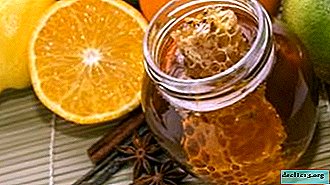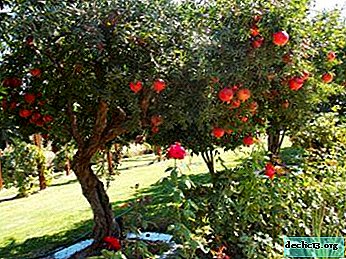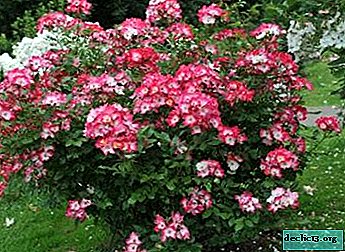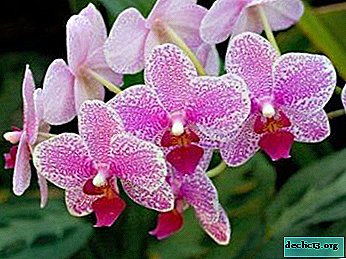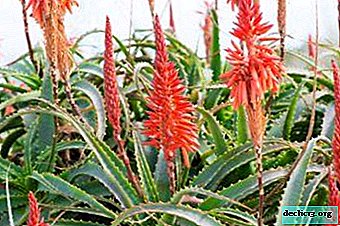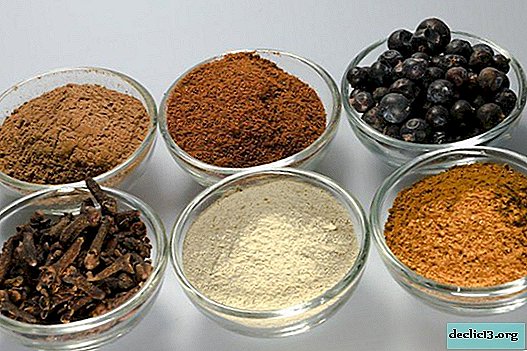The whole truth about aloe: what you need to know about this plant and is it possible to keep it at home?
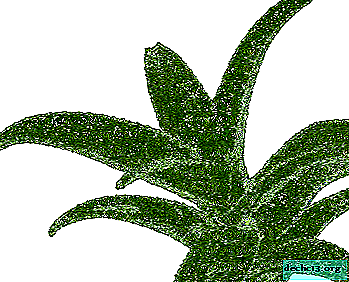
Many people have an evergreen unpretentious, highly branched aloe tree. In winter, it perfectly tolerates the cool temperature of the room and does not require watering at all. We wrote about aloe vera care in this article.
More than 500 species are common in nature, but they all grow in Africa and Arabia. Aloe Vera: a native of the Canary Islands, is cultivated as a pot culture. Many people use different types of flowers as a decorative decoration for the home. Aloe is one of those plants that can not only decorate the room, but also help in the healing of the family.
Is the plant healing?
To begin with, we will analyze aloe from the point of view of chemistry. The leaves and juice of the plant are saturated:
- resinous substances (up to 10%);
- organic acids;
- anthrachionins (has a laxative and analgesic effect);
- glucocide (laxative and atibiotic effect);
- Antranol and Antacene (a catalyst for the fixation of oxygen in the blood);
- emodin aloevoy (laxative effect);
- cinnamic acid (soothes pain and exhibits a laxative effect);
- essential oil (soothing);
- chrysophanic acid (antifungal);
- ulcin (antiulcer, inhibits gastric secretion through a reaction with histamine);
- vitamins: A, B1, B2, B3, B4, B5, B6, B12, C, E.
Many people wonder if the plant is poisonous or not. But he cannot be like that. Aloe has many healing functions and beneficial substances in the composition for the human body. In more detail about the medicinal properties and contraindications to the use of this wonderful plant, we wrote in this article.
Reference! Not all types of aloe can boast of benefits for humans. Some species, namely striped aloe and awesome aloe, have the opposite effect on humans.Can I keep at home?
 Why is it worth keeping aloe as a houseplant and you can not refuse to grow it in the house, as all friends advise? The fact is that aloe is able to purify the air, making it fresh, and also enriches it with volatile production. The pulp of the plant is added to some dishes during cooking.
Why is it worth keeping aloe as a houseplant and you can not refuse to grow it in the house, as all friends advise? The fact is that aloe is able to purify the air, making it fresh, and also enriches it with volatile production. The pulp of the plant is added to some dishes during cooking.
Aloe also has a very unusual look and is quite suitable as a room decoration.
This plant favorably affects a person due to the huge amount of various amino acids, microelements, vitamins, etc.
Contraindications
Despite all the healing properties, aloe has a negative effect. In some situations, scarlet can be harmful to human health and the body:
- If you or a member of your family has problems with allergies, then aloe is clearly contraindicated, because this plant has a number of active substances that can cause all kinds of irritations and rashes.
- If you dispose of aloe properly, it can lead to upset stomach, vomiting, and inflammation.
- The plant is contraindicated in pregnant girls and women because of the risk of miscarriage.
What else needs to be grown?
Here is a list of some possible useful plants for the home:
 Peppermint. A plant that is perfect for the kitchen because of its specific properties. It stimulates digestion, improves appetite, and if you suddenly need a leaf of mint to prepare a dish, you no longer have to run to the store. It is in the kitchen that this plant can not only come in handy for a salad, but it also fits perfectly into the space of a small room.
Peppermint. A plant that is perfect for the kitchen because of its specific properties. It stimulates digestion, improves appetite, and if you suddenly need a leaf of mint to prepare a dish, you no longer have to run to the store. It is in the kitchen that this plant can not only come in handy for a salad, but it also fits perfectly into the space of a small room.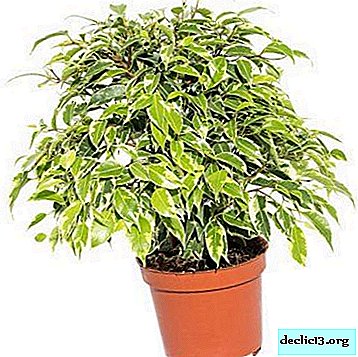 Ficus A very beautiful plant, it brings a lot of benefits to the home and to the mood of a person. It is grown mainly in warm home conditions. Among all plants, it stands out for its ability to collect dust well, in addition, it saturates the air with oxygen and removes odors. Also, ficus is like no other plant easy to wash and wipe due to its leathery leaves.
Ficus A very beautiful plant, it brings a lot of benefits to the home and to the mood of a person. It is grown mainly in warm home conditions. Among all plants, it stands out for its ability to collect dust well, in addition, it saturates the air with oxygen and removes odors. Also, ficus is like no other plant easy to wash and wipe due to its leathery leaves.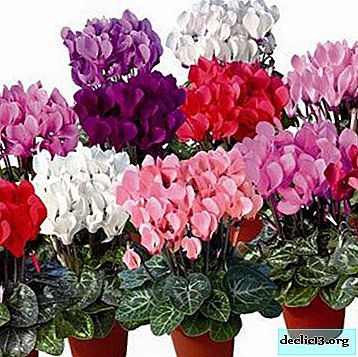 Cyclamen. A great option for a children's room. It well destroys harmful bacteria and has a stunning appearance, which is great for a child’s creative endeavors. The only thing to consider is that it is undesirable to exhibit an excessive number of flowers in the baby’s bedroom - an allergic reaction is possible.
Cyclamen. A great option for a children's room. It well destroys harmful bacteria and has a stunning appearance, which is great for a child’s creative endeavors. The only thing to consider is that it is undesirable to exhibit an excessive number of flowers in the baby’s bedroom - an allergic reaction is possible.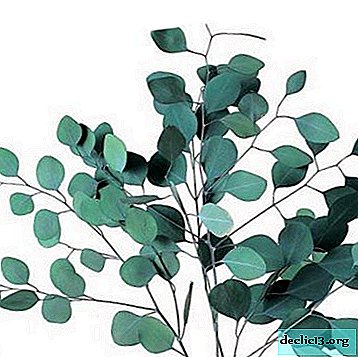 Eucalyptus. Suitable for people with problems in the respiratory system, in particular asthmatics. The leaves of this plant secrete substances that relieve bronchospasm and facilitate breathing. Unlike cyclamen, this plant can be kept in the bedroom in a fairly large amount. This will have a very beneficial effect on well-being.
Eucalyptus. Suitable for people with problems in the respiratory system, in particular asthmatics. The leaves of this plant secrete substances that relieve bronchospasm and facilitate breathing. Unlike cyclamen, this plant can be kept in the bedroom in a fairly large amount. This will have a very beneficial effect on well-being.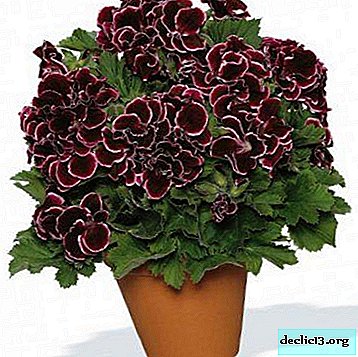 Geranium. It is popular because of its healing properties. She fights pathogenic bacteria and moths. It will help people with insomnia and irritation. And the smell of flowers relaxes and relieves a headache. (It is advisable not to put the plant near the bed).
Geranium. It is popular because of its healing properties. She fights pathogenic bacteria and moths. It will help people with insomnia and irritation. And the smell of flowers relaxes and relieves a headache. (It is advisable not to put the plant near the bed).
Conclusion
Unfortunately, it is difficult to lay out all the cards in one article, to talk about all the useful properties and disadvantages of plants for the home. Take care of the favorable atmosphere in the house, enjoy the beauty and look after your green friends.

 Peppermint. A plant that is perfect for the kitchen because of its specific properties. It stimulates digestion, improves appetite, and if you suddenly need a leaf of mint to prepare a dish, you no longer have to run to the store. It is in the kitchen that this plant can not only come in handy for a salad, but it also fits perfectly into the space of a small room.
Peppermint. A plant that is perfect for the kitchen because of its specific properties. It stimulates digestion, improves appetite, and if you suddenly need a leaf of mint to prepare a dish, you no longer have to run to the store. It is in the kitchen that this plant can not only come in handy for a salad, but it also fits perfectly into the space of a small room. Ficus A very beautiful plant, it brings a lot of benefits to the home and to the mood of a person. It is grown mainly in warm home conditions. Among all plants, it stands out for its ability to collect dust well, in addition, it saturates the air with oxygen and removes odors. Also, ficus is like no other plant easy to wash and wipe due to its leathery leaves.
Ficus A very beautiful plant, it brings a lot of benefits to the home and to the mood of a person. It is grown mainly in warm home conditions. Among all plants, it stands out for its ability to collect dust well, in addition, it saturates the air with oxygen and removes odors. Also, ficus is like no other plant easy to wash and wipe due to its leathery leaves. Cyclamen. A great option for a children's room. It well destroys harmful bacteria and has a stunning appearance, which is great for a child’s creative endeavors. The only thing to consider is that it is undesirable to exhibit an excessive number of flowers in the baby’s bedroom - an allergic reaction is possible.
Cyclamen. A great option for a children's room. It well destroys harmful bacteria and has a stunning appearance, which is great for a child’s creative endeavors. The only thing to consider is that it is undesirable to exhibit an excessive number of flowers in the baby’s bedroom - an allergic reaction is possible. Eucalyptus. Suitable for people with problems in the respiratory system, in particular asthmatics. The leaves of this plant secrete substances that relieve bronchospasm and facilitate breathing. Unlike cyclamen, this plant can be kept in the bedroom in a fairly large amount. This will have a very beneficial effect on well-being.
Eucalyptus. Suitable for people with problems in the respiratory system, in particular asthmatics. The leaves of this plant secrete substances that relieve bronchospasm and facilitate breathing. Unlike cyclamen, this plant can be kept in the bedroom in a fairly large amount. This will have a very beneficial effect on well-being. Geranium. It is popular because of its healing properties. She fights pathogenic bacteria and moths. It will help people with insomnia and irritation. And the smell of flowers relaxes and relieves a headache. (It is advisable not to put the plant near the bed).
Geranium. It is popular because of its healing properties. She fights pathogenic bacteria and moths. It will help people with insomnia and irritation. And the smell of flowers relaxes and relieves a headache. (It is advisable not to put the plant near the bed).